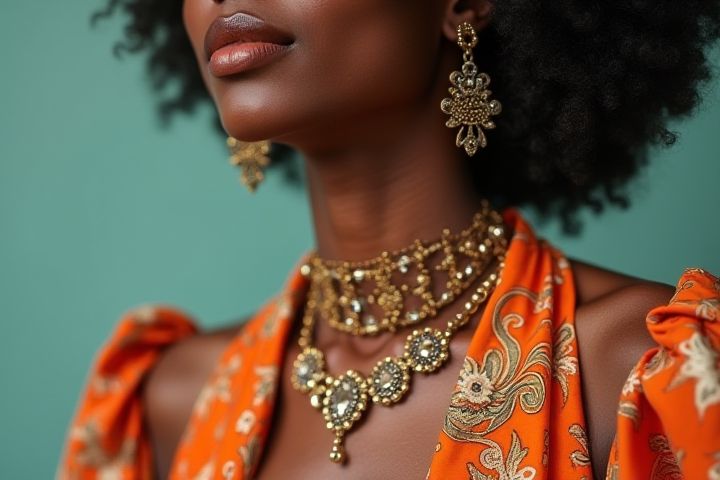
Fashion trends in Nigeria are a vibrant reflection of the country's rich cultural heritage and diverse ethnic backgrounds. Traditional attire, such as the agbada for men and the gele for women, showcase intricate designs and bold colors, symbolizing pride in Nigerian identity. Contemporary styles often blend modern silhouettes with indigenous fabrics like ankara and kente, creating unique, eye-catching ensembles. Influential fashion designers, such as Lisa Folawiyo and Deola Sagoe, are gaining international recognition for their innovative approaches, inspiring a new generation of fashion enthusiasts. As you explore Nigeria's fashion landscape, you'll discover that it's not just about clothing; it's a celebration of artistry, craftsmanship, and self-expression.
Nigerian traditional attire
Nigerian fashion trends prominently feature traditional attire, celebrating the rich cultural heritage through vibrant fabrics and intricate designs. Styles such as Ankara, Aso Oke, and Adire highlight unique patterns and hues, representing various ethnic groups like the Yoruba, Igbo, and Hausa. Tailoring techniques play a crucial role, with skilled artisans crafting garments that blend modern aesthetics with age-old craftsmanship. You can see these trends displayed at cultural festivals and events, showcasing the evolving narrative of Nigerian identity in the global fashion arena.
Ankara prints
Ankara prints dominate Nigeria's fashion scene, characterized by vibrant colors and intricate patterns that reflect the country's rich cultural heritage. These textiles are versatile, frequently used in traditional attire like dresses, skirts, and blouses, as well as contemporary fashion pieces such as streetwear and accessories. Designers are increasingly incorporating Ankara into global fashion trends, showcasing the fabric at international fashion shows and collaborations. Embracing Ankara not only supports local artisans but also promotes sustainable fashion practices by emphasizing locally sourced materials and designs.
Aso Ebi culture
Aso Ebi culture in Nigeria emphasizes vibrant, coordinated attire typically worn by family and friends at celebrations such as weddings and parties. This tradition involves selecting specific colorful fabrics, often embellished with intricate patterns and beadwork, fostering a sense of unity among attendees. Designers continually innovate within this realm, blending traditional styles with contemporary fashion elements, appealing to both local and international audiences. Your choice of Aso Ebi can reflect personal style while honoring cultural heritage, making it a significant aspect of Nigerian identity in the fashion landscape.
Fusion of modern and traditional styles
In Nigeria, fashion trends prominently highlight the fusion of modern and traditional styles, showcasing vibrant fabrics and intricate patterns. Designers expertly incorporate native textiles like Ankara and Aso Oke into contemporary silhouettes, creating unique garments that reflect cultural heritage. This blended approach not only preserves Nigerian traditions but also appeals to a global audience, encouraging the use of bold colors and innovative designs. You can find these eclectic styles at local markets, fashion shows, and online platforms, contributing to a dynamic and evolving fashion landscape.
Use of bold colors
In Nigeria, contemporary fashion trends prominently feature bold colors that reflect the country's vibrant culture and artistic heritage. Designers often incorporate traditional fabrics such as Ankara, which showcase intricate patterns and vivid hues, attracting attention both locally and globally. The use of eye-catching shades is not only a means of self-expression but also a celebration of cultural identity among Nigerian fashion enthusiasts. Embracing these bold colors allows you to make a striking statement while honoring the rich tapestry of Nigeria's fashion landscape.
Tailored craftsmanship
Fashion trends in Nigeria emphasize the importance of tailored craftsmanship, celebrating the rich heritage of textile production and design. Designers showcase unique styles, incorporating indigenous fabrics such as Ankara and Aso-Oke, which reflect cultural narratives and personal identities. Tailoring techniques are meticulously crafted to fit diverse body types, ensuring comfort while enhancing the visual appeal of each outfit. You can find a vibrant fusion of contemporary fashion and traditional elements, resulting in a dynamic wardrobe that resonates with both local and global audiences.
Influence of Nollywood
Nollywood, Nigeria's vibrant film industry, significantly shapes the nation's fashion trends, making it a powerful cultural force. The industry showcases a diverse array of styles, from traditional attire such as the agbada and buba to contemporary streetwear, influencing how Nigerians express their identity through fashion. Celebrities and actors often serve as style icons, prompting fans to emulate their looks, which enhances local fabrics and designers' visibility. As you explore Nigerian fashion, you'll find that these trends reflect a unique blend of cultural heritage and modern influences, celebrating both artistry and individuality.
Celebrity fashion influence
Celebrity fashion in Nigeria significantly shapes the country's contemporary style landscape, where icons like Wizkid and Tiwa Savage popularize vibrant, culturally-infused designs. Designers such as David Tlale and Tiffany Amber blend traditional motifs with modern aesthetics, creating high demand for bespoke pieces that resonate with the public. Social media platforms, particularly Instagram, amplify these fashion trends, allowing fans to emulate the unique looks of their favorite stars. Consequently, this dynamic interplay between celebrity culture and fashion has established a rich tapestry of self-expression and creativity in Nigeria's fashion scene.
Fast fashion impact
Fast fashion in Nigeria has significantly altered the textile and apparel industry, making trendy clothing more accessible and affordable for the population. With the rise of local and international brands utilizing online platforms, consumers can swiftly adopt the latest styles that reflect global fashion movements. However, this trend also raises concerns about sustainability and the economic implications for traditional artisans, as mass-produced garments often overshadow handcrafted items. Understanding the balance between embracing modern styles and preserving cultural heritage is crucial for Nigeria's evolving fashion landscape.
Rise of local designers
The rise of local designers in Nigeria has transformed the fashion landscape, showcasing a vibrant blend of traditional African textiles and contemporary design. These designers are gaining international recognition, incorporating bold patterns and cultural motifs that reflect Nigeria's rich heritage. Events like Lagos Fashion Week serve as platforms for emerging talents to showcase their creations, attracting global brands and influencers. By supporting local designers, you contribute to the growth of the Nigerian economy and the preservation of cultural identity in fashion.
